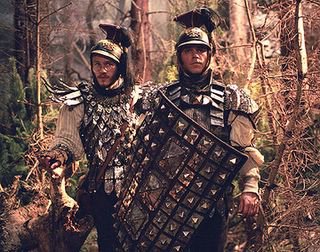The Brothers Grimm
Terry Gilliam has yet to direct a bad film. Even when his movies are conceptually weak, employ dull characters or include uninspired stretches of generic storytelling, the director's good humor, passion and marvelous visual acuity make them at the very least entertaining.
This summer's expensive flop The Brothers Grimm probably stands as the director's "worst" film, in that it has the most numerous and obvious flaws. Ehren Krueger's woefully tepid script just keeps throwing in the bizarre set pieces and tired allusions, hoping that something will stick. Neither Matt Damon nor Heath Ledger seem terribly interested in supplying actual performances. Peter Stormare gives an obnoxious, nearly indescipherable turn as an Italian schemer. The CG effects look glossy and cartoonish. And for an alleged comedy, the jokes come infrequently and land with a defiant thud.
And yet...I still enjoyed the movie. Despite all the problems of Brothers Grimm, Terry Gilliam still has yet to direct a bad film.
And it's not just the marvelous sets and costumes that are the standard in every Gilliam production. The director has demonstrated his affinity for this sort of storybook/fairy tale/fantasy entertainment before, and really fills his movie with delightful little details and small touches. As well, he finds just the right balance here between childlike flights of fancy and the bloody, Grand Guginol theatrics of Grimm Fairy Tales. Brothers Grimm unfolds much like a children's movie, but just like the surprisingly grisly stories that provide the basis for most Disney cartoons, the action is driven by a subtle undercurrent of horror.
Krueger, responsible for the script to one of 2005's worst films, The Ring Two, as well as the original Ring and Scream 3, has written a script that's almost too high concept for its own good. It reimagines the historical Brothers Grimm (Ledger and Damon) as charlatans, bilking simple-minded German villagers out of their gold during the rule of the Napoleanic army. They find small towns in the grips of ancient folklore or superstition, and then "exorcize the town of evil."
After they are captured by an odious French General (Jonathan Pryce, a veteran of many Gilliam films), they are assigned to a village dealing with a genuine supernatural menace - a wicked Queen living in a tower (Monica Bellucci) who kidnaps children in a bid to remain forever young.
It's a one-joke kind of premise...These professional frauds now must deal with an actual enchanted forest, and of course, along the way, they constantly meet counterparts to beloved fairy tale characters. The problem is, Krueger (and, in his own way, Gilliam) seem to assume that merely referencing these old characters will be enough to entertain an audience. We get a scene with Hansel and Gretel traipsing towards a gingerbread house, leaving a trail of breadcrumbs in their wake, but there's no pay-off...It's just a reference.
Some of these sequences are extremely well-shot and realized. A scene where Little Red Riding Hood evades a hungry wolf through the woods at sunset is vivid, colorful and gorgeously shot byNicola Pecorini or Thomas Newton Sigel (IMDB credits them both), but these scenes add up to very little. Other references include Snow White, Rumpelstilsken, Rapunzel, Cinderella, Sleeping Beauty, The Frog Prince and The Gingerbread Man. It all grows tiresome very quickly.
It's not terribly surprising that the script isn't up to snuff, I suppose. It feels rushed in the same way as a lot of Hollywood product. What is surprising is how little Gilliam managed to get out of his actors. Generally, even if the material isn't terrific (as in Baron Munchausen), Gilliam can still squeeze out a charming performance or two from his ensembles, and here he's got some talented people to work with. Ledger and Damon (whose characters are supplied with a thin, artificial backstory about growing up inpoverished and desperate) seem patently uninterested in the entire production. I know their lines aren't funny, but they don't even try.
And Peter Stormare tends to go over the top, but this is his worst performance to date as the ludicrous Cavaldi, a pompous, preening Italian coward in a bad toupee. He's trying for a silly accent, but most of his lines just come out as garbled nonsense. Unfortunately, I sense he was intended as comic relief, which might of worked if I could understand the words that he was speaking.
I'm also surprised that Gilliam doesn't have a better handle on Computer-Generated effects work. Granted, the only other film he's made to employ CG was Fear and Loathing in Las Vegas, and the work was fairly limited in that film. But Brothers Grimm features what I'd refer to as "UPN effects," meaning it looks like a bad science fiction TV show. In an early scene, Gretel's shawl blows off her shoulders and floats down by a river, seemingly on its own power. The CG wrap twisting in the wind is among the most cartoonish and patently false-looking effects I have seen since the alien at the end of Mission to Mars. How can a guy who is so brilliant with design and practical effects be so incapable of telling that a certain scene's CG was simply not working?
I know it sounds harsh, and I do consider Brothers Grimm to be Gilliam's weakest film, as I said. But I don't think it's without value. It's slight, no doubt, but it looks great, and it shares a spirit with the rest of his work. The relationship between the two brothers - Jake who lives in a world of his imagination and Will who insists on remaining a realist - mirrors the dichotomy present in all of Gilliam's films. His movies exist in the boundary between reality and fantasy, and Brothers Grimm is a silly and fairly dumb action-comedy that spends nearly two hours exploring this ripe material for slight entertainment. There are worse ways you could spend your time.

No comments:
Post a Comment